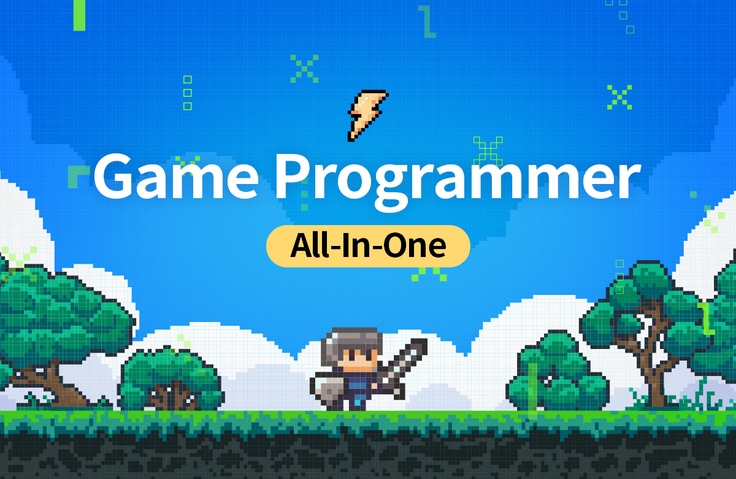[All-in-One Introduction to Game Programming] C++ & Data Structures/Algorithms & STL & Game Mathematics & Windows API & Game Server
This is an all-in-one curriculum for game programming beginners who are unsure of where to start. It is a comprehensive curriculum that covers the basics of game programming, including C++, data structures/algorithms, STL, game mathematics, Windows API, and an introduction to game servers.
1,440 learners
Level Beginner
Course period Unlimited

[Rookiss University] PD Introduction Course Opens (Every Sunday 8pm~11pm)
hello,
As announced in the previous notice, we will begin the introduction to PD studies on November 5th.
It is held every Sunday (8pm-11pm) and Rookiss himself conducts the lecture live.
This course is free and open to everyone.
This series will continue indefinitely, and the broad topics covered are as follows:
- Game development process
- Game development skills
- Schedule calculation and team building
- Game design practice (idea->planning->development->results)
Our Discord channels are below:
https://discord.gg/y6EK6EsJQz
Basically, I'm going to do it on Discord
If we get too many people, we're thinking of moving to Twitch.
Below is an introduction to PD studies.
Most people who enter the game industry study and step into the industry, thinking about the games they love so much. However, when they actually join the company, their expectations are shattered and the project always feels like it is drifting. New employees who join the planning department are full of hope that they will spread their imagination and create a great game, but in reality, they become slaves to data and become odd jobs that take on ambiguous tasks. My efforts to analyze games diligently are useless, and I feel a great sense of disillusionment at the work of having to write a reverse planning report for a gacha game that is in the top sales rankings. I have seen countless planners who are disappointed by this reality while working at the company, and many of them change their positions to programmers or other departments. Surprisingly, contrary to popular belief, planners in the game industry do not plan. In the first place, the absolute power to make creative plans and set directions is given only to PDs (directors).
In my opinion, a <planner> is ultimately a PD. Even in a large company, there are only about 10 projects, so there are only so many positions for a PD, so it doesn't seem necessary to worry about it. However, in order to achieve something in a game company, you must become a PD, or find a great PD and join that team. This is because no matter how excellent the team members' abilities are, if the game is headed in the wrong direction, the project is already hopeless. So what should you study to become a PD, and what talents do you need? How do actual companies select PDs, and what do they expect from them? These are very fundamental, essential, and obvious concerns, but it's not easy to get a clear answer to them. This is because these concerns are mainly raised by company executives or management, not by ordinary workers.
PDs actually have 99% of the project's success stakes because they determine the direction of the project. Although this is such an important position, it's hard to see any systematic efforts to train PDs, and there's no perfect answer in the first place. If there's someone who has a 100% sure answer on how to make a fun and well-selling game, it's probably a fraud. And of course, I don't know the formula for success either. However, at least in this uncertainty, I think the essential qualities that a PD should have are clear.
I was fortunate to gain experience at a great company and indirectly witness the process of creating a blockbuster game called <PUBG>, and on the other hand, I was able to experience the problems of drifting projects. Many projects went downhill due to various internal political issues and the lack of capabilities of the PD or development team. The company always tries various things to find answers to these concerns, and some even introduce an incubator system to receive challenging proposals. However, when I meet and talk to the company's executives, the common complaint is that there is no PD who understands development well but has a good sense. Employees who have not usually had these concerns propose extremely ideal games that do not consider realistic conditions. (Ex. I want to make a game that combines WoW+Genshin+Zelda!) In essence, unlike webtoons and web novels, games should not be planned <anything> <using imagination>, but should be thought about considering the best cost-effectiveness and schedule within a realistic development scope.
In this course, which Rookiss will personally lead on Sundays, we will systematically learn the basic development knowledge that a PD should know, development process, schedule calculation, team composition, and development cost measurement, and we will show you the process of starting from game ideation and turning it into reality with the goal of launching. (And you can get some training if you participate in the live lecture :D) The goal is to naturally cultivate a PD's sense by learning the development cycle that includes organizing a development team by setting a budget, outsourcing some art, and leading to BM design and post-launch indicator verification.




